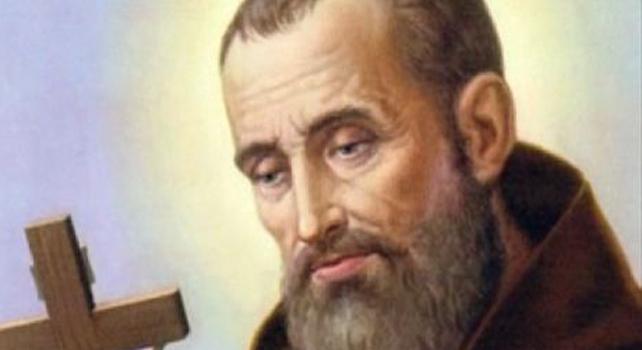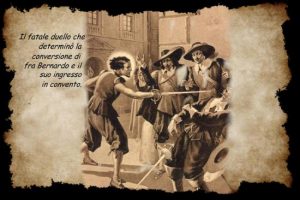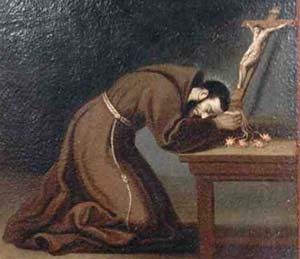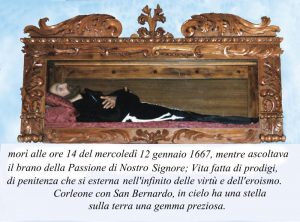
St. Bernardo of Corleone was a swordsman and shoemaker who became a Capuchin religious brother. He was born Filippo Latini in 1605 at Corleone, Sicily in modern-day Italy. He was raised in a devout Catholic family and their home was known as “the house of saints”. His father was a cobbler who was so compassionate to the needy that he would walk around the village begging alms for them during the cold months. Filippo had no formal education, but he was devoted to his faith. When he was fifteen, his father died, and he took over the shoe-making business, His parents taught him to have a soft heart for the needy. He was even known to bring impoverished people to his home to be fed, washed, and clothed.
A DANGEROUS QUICK TEMPER

Filippo’s real passion as a young man, however, was sword-fighting. He had a quick temper, and would enter into duels at a moment’s notice, to the great concern of his family. In 1624, when he was just nineteen years old, he entered into a sword duel with an especially pompous instigator. Filippo won the duel, but set off an uproar, because he wounded his opponent’s arm so badly that it had to be amputated. Filippo was now known as “the finest blade in Sicily”, but he was filled with remorse. He pleaded with the man to forgive him, and the two actually became friends.
A METANOIA
Still overcome with remorse, Filippo sought out the safe harbor of a church, resolved to change his ways. After a time of prayer and discernment spent with the Capuchin friars, he left his cobbler business behind and entered the Capuchin Order in 1631 at Caltanissetta. He requested the name Bernardo and became a brother. As a lay brother, Bernardo spent much of his time doing menial tasks – primarily kitchen and laundry work as well as taking care of the sick. He volunteered for these tasks and preferred to be of service to the priests and brothers. Brother Bernardo lived his monastic life filled with more penances than were required, what we might consider a perpetual Lent. He frequently admonished his brothers to “love God and do penance for our sins”. He slept just three hours each night, sleeping on a wooden board with a wood block pillow. He ate only bread, herbs, and water, and he ate while kneeling on the floor. If he was compelled by obedience to join the other friars for the monastic meal, he complied, but would become sick and feverish as a result.

A TRUE MYSTIC
Brother Bernardo was also a mystic. He was drawn to spend a great deal of time in the chapel, especially at night, for he was distressed at the thought that the Lord was all alone in the chapel. He would experience ecstasies, sometimes evinced by levitation, and he would be incapable of perceiving his earthly surroundings during such times. He often volunteered to assist the sacristan, in order to stay as close to the tabernacle as possible. When a calamity – such as an earthquake – would occur, he would hasten to the tabernacle to plead aloud for the people to be spared, and the problem quickly abated. His simple wooden crucifix was very precious to him. Brother had a difficult time reading, and on one occasion, the Lord allegedly appeared to him, telling him that he need not strive to read and that the study of His image in the crucifix was sufficient study for him. Brother Bernardo had a gentle disposition, and the troubled and poor people who spoke with him went away consoled. People brought their sick animals to him for his prayers. He especially had sympathy for the farm animals necessary for survival, such as cattle, mules, and horses. After he recited an Our Father and walked the animal around the cross in front of the monastery, in many cases, the ailing animal was cured.
As a brother subject to vows of obedience, Brother Bernardo was moved from one monastery to another at least nine times. He lived the last fifteen years of his life at Palermo.
A HOLY DEATH
He died there on January 12, 1667, at age sixty-one. One of the Capuchins, Brother Anthony, witnessed him just after his death, ecstatic, radiating light, and proclaiming how worthwhile were his many penances, fasts, and acts of obedience. Miracles were reported to have occurred for those who visited his grave. Because of his sanctity and the miracles which were reported both during and after his lifetime, he was beatified in 1768. However, his canonization was delayed until a miracle was approved in 1999. He was canonized by Pope [St.] John Paul II in 2001. St. Bernardo of Corleone is especially remembered on his feast day, January 12.

